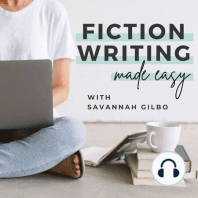18 min listen

#16: Conventions vs. Tropes: What's the Difference?
#16: Conventions vs. Tropes: What's the Difference?
ratings:
Length:
19 minutes
Released:
Jul 7, 2020
Format:
Podcast episode
Description
In today's episode, I'm going to walk you through the difference between genre conventions and tropes. Here's a preview of what's included:[01:28] Genre conventions are story elements such as character archetypes, key events, and settings that are commonly found in a specific genre. These conventions define each specific genre and readers' expectations of a story in that genre.[03:10] Tropes are a specific way of delivering those genre conventions or obligatory scenes in your novel. They are subjective interpretations of a genre convention.[04:35] Genre conventions usually have an objective reason WHY they exist in a story while tropes usually do not. Genre conventions need to be met in order for your story to work and to satisfy readers' expectations. The way you deliver those conventions, or the tropes you choose to use, is totally up to you.[05:45] Some examples of tropes vs. conventions including the "Chosen One" vs. the Dark Lord, a love triangle that includes a "good guy" vs. a "bad guy." [07:25] Common mistake #1: Ignoring genre conventions because they think all conventions are tropes, and all tropes are predictable or cliche. This isn't true! Genre conventions help us write a story that works and that satisfies readers.[09:35] Common mistake #2: Including a bunch of tropes in their story without any kind of real purpose. As a general rule of thumb, always ask WHY something needs to be in your book. If you can't think of one, it probably doesn't belong.[11:00] Common mistake #3: Following every single rule in every single book. Instead, pick one method or one set of "rules" and focus on getting your draft finished. Once it's finished, you can go back through it and start to shape it into a story that works.[13:15] Do you really have to include all the obligatory scenes and conventions of your genre in your story? Nope. It's your story, you can do whatever you want. But, if you choose to veer away from the guidelines of your genre, you'll also want to readjust your expectations and your goals. Publishers probably won't pick up your book if you don't adhere to the genre guidelines.[15:05] Key points and episode recap.Subscribe & Review in Apple PodcastsAre you subscribed to my podcast? If you’re not, I want to encourage you to do that today. I don’t want you to miss an episode! Especially because I’m adding a bunch of bonus episodes to the mix and if you’re not subscribed there’s a good chance you’ll miss out on those. So, click here to subscribe to the show in Apple Podcasts!If you're already a subscriber, and if you enjoy the show, I would be really grateful if you left a review over on Apple Podcasts, too. Those reviews help other writers find my podcast and they’re also super fun for me to go in and read. Just click here to review, select “Ratings and Reviews” and “Write a Review” and let me know what your favorite part of the show is. Thanks in advance!Links mentioned in this episode:How to Choose the Best Genre for Your Story (article)Wondering what the obligatory scenes and conventions for your genre are? Click heClick here to register for the free masterclass > The 5 Little-Known Mistakes Most Fiction Writers Make (+ What to Do Instead). In this masterclass, we’re going to talk about the most common mistakes I see writers make so that you can avoid them and write your draft in the most efficient way possible.
Released:
Jul 7, 2020
Format:
Podcast episode
Titles in the series (100)
How to Identify Your Story's Ideal Reader by Fiction Writing Made Easy